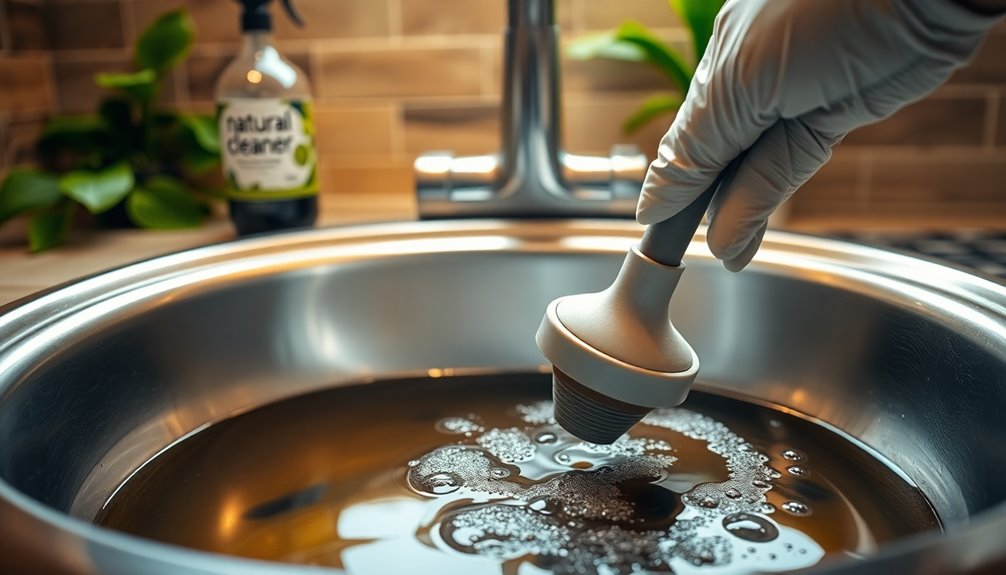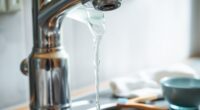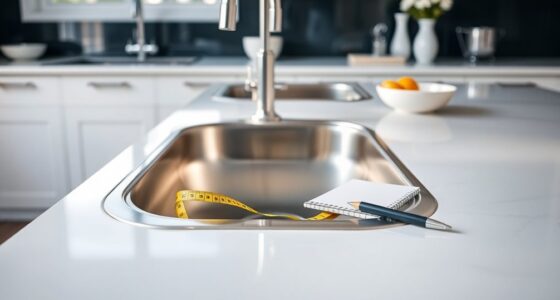To unclog grease from your sink, start by pouring ½ cup of baking soda down the drain, followed by ½ cup of vinegar. Cap the drain to increase effectiveness, and let it sit for at least an hour. Then, rinse with boiling water to flush away loosened debris. For tougher clogs, mix equal parts boiling water and vinegar and pour it down the drain. If issues persist, there's more you can do to tackle that stubborn blockage.
Key Takeaways
- Use a mixture of ½ cup baking soda and ½ cup vinegar to break down grease, allowing it to fizz for 30 minutes.
- Pour boiling hot water down the drain to help dissolve minor grease clogs.
- Cap the drain after adding baking soda and vinegar to enhance the cleaning effect.
- Rinse the drain with additional hot water after the mixture has settled to flush away loosened grease.
- Call a professional plumber if clogs persist, as they have specialized tools for effective solutions.
Causes of Grease Build-Up in Drains
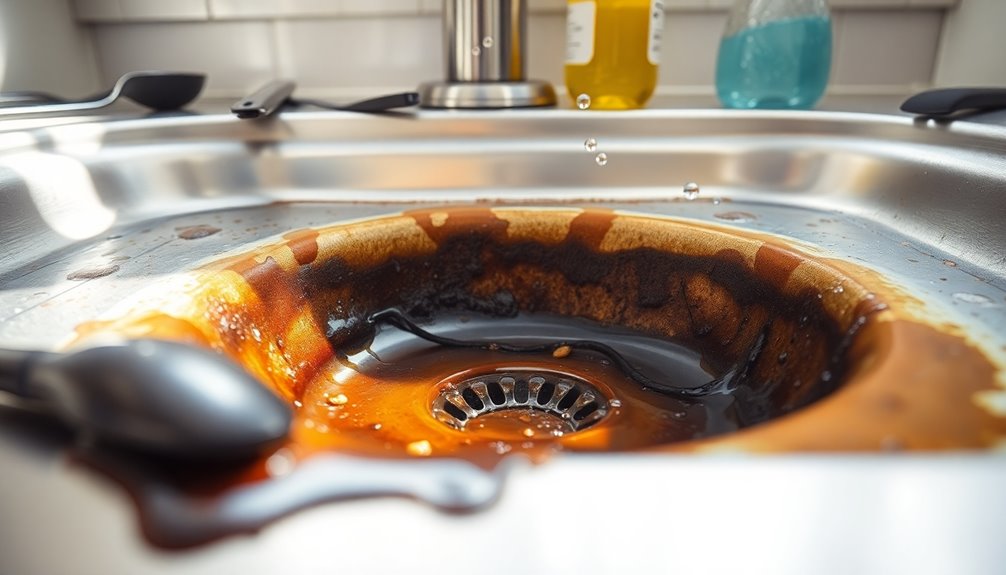
When you wash greasy pans and dishes down the sink, you're likely contributing to grease build-up in your drains.
Cooking with meat and dairy products releases fats that can solidify in your pipes over time. Each time you rinse grease down the drain, it cools and adheres to the pipe walls, narrowing the passage and causing slow drainage.
This accumulation leads to grease clogs, which can create plumbing issues. You'll notice signs like loud gurgling sounds, persistent unpleasant odors, and water backing up into the sink.
To prevent problems, it's essential to avoid pouring grease down the sink. Regular maintenance, including flushing your drains with hot water, can help keep grease build-up at bay and maintain smooth drainage.
Best Ways to Clean Grease From Drains
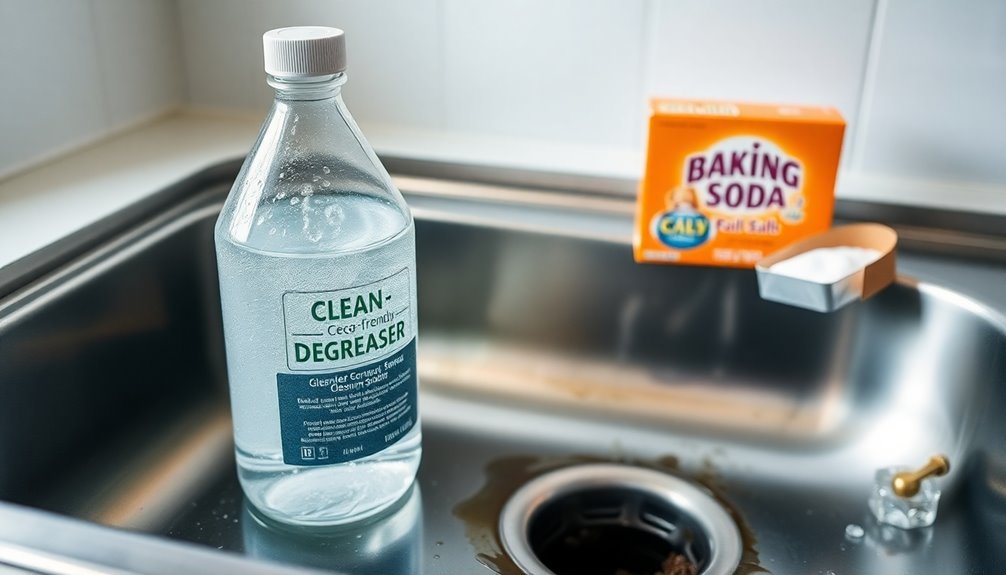
Grease buildup in drains can be a persistent nuisance, but there are effective ways to tackle the problem.
One popular method is using a mixture of baking soda and vinegar. Pour about half a cup of baking soda down the kitchen sink, followed by half a cup of vinegar. Let it fizz for about 30 minutes, then flush with hot water to help dissolve grease.
For minor clogs, pouring boiling hot water down the drain can also improve drainage. Regularly flushing your drains with hot water and dish soap can prevent future grease accumulation.
If your drain is clogged despite these efforts, don't hesitate to call a professional plumber for expert assistance.
Avoid harsh chemical degreasers, as they can harm your pipes.
Unclogging a Drain With Water and Vinegar
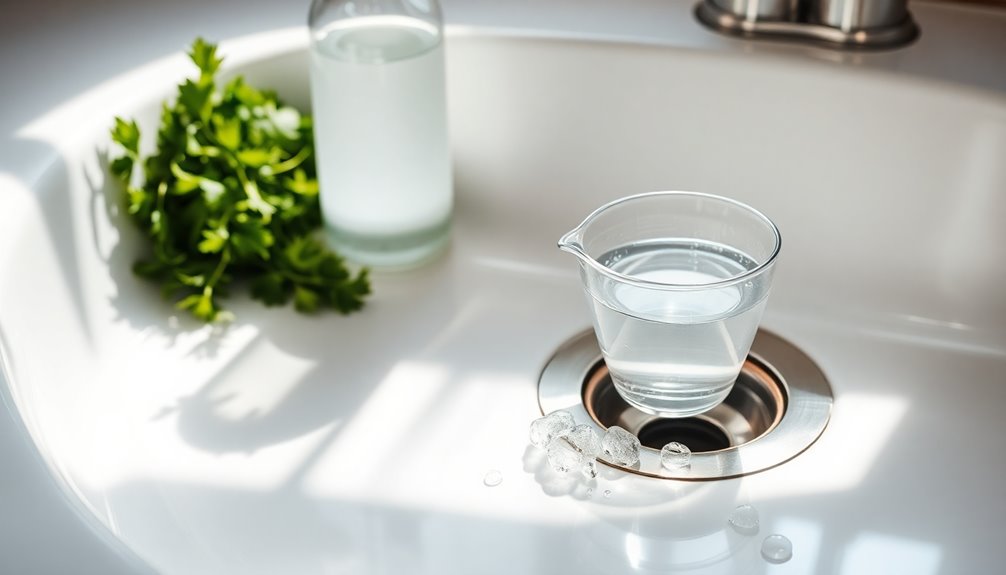
If you're facing a stubborn drain clog, using a combination of water and vinegar can be an effective solution.
Start by mixing equal parts of boiling water and white vinegar in a heat-resistant container. Carefully pour the solution down the drain to tackle that grease buildup.
- Always wear oven mitts and eye protection when handling boiling water.
- Monitor the drainage rate; if it improves, repeat as needed.
- Rinse with additional hot water after normal drainage resumes to flush away remaining grease.
This method helps keep the drain clear without relying on harsh chemicals.
Regularly using this technique can prevent future clogs and maintain flow, ensuring you won't have to deal with that pesky clog in your drain again.
Unclogging a Sink With Baking Soda and Vinegar
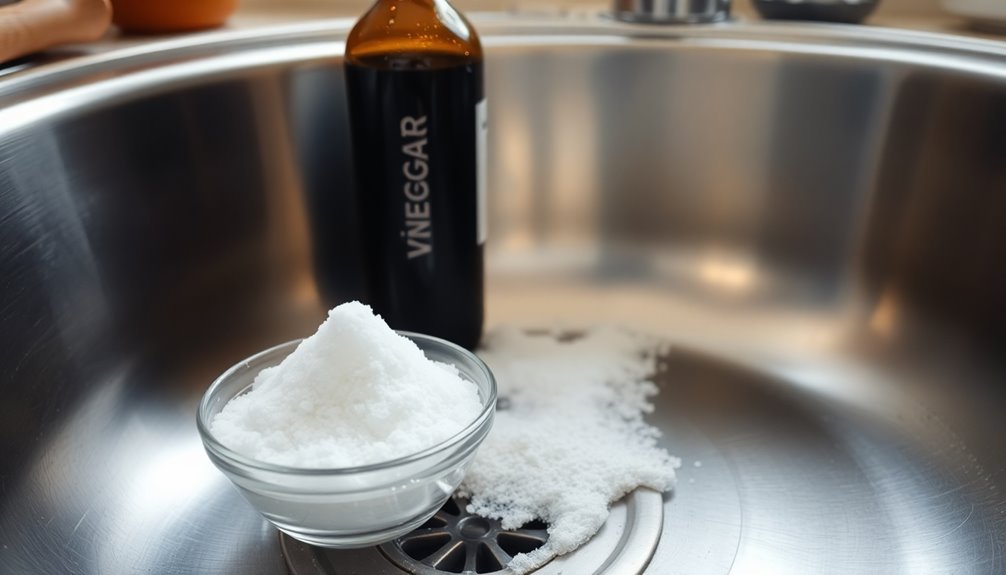
While water and vinegar can effectively tackle minor clogs, stubborn grease buildup may require a bit more effort.
To unclog your sink, start by pouring ½ cup of baking soda down the drain, followed by ½ cup of vinegar. This combination creates a bubbling reaction that helps break up the grease. Be sure to cap the drain to trap the gases produced, enhancing its effectiveness.
Let the mixture sit for at least an hour, or overnight if possible. Afterward, rinse the drain with boiling water to flush away any loosened grease and residue.
For particularly stubborn clogs, you might need to repeat this baking soda and vinegar process a couple of times for best results.
When to Call a Professional
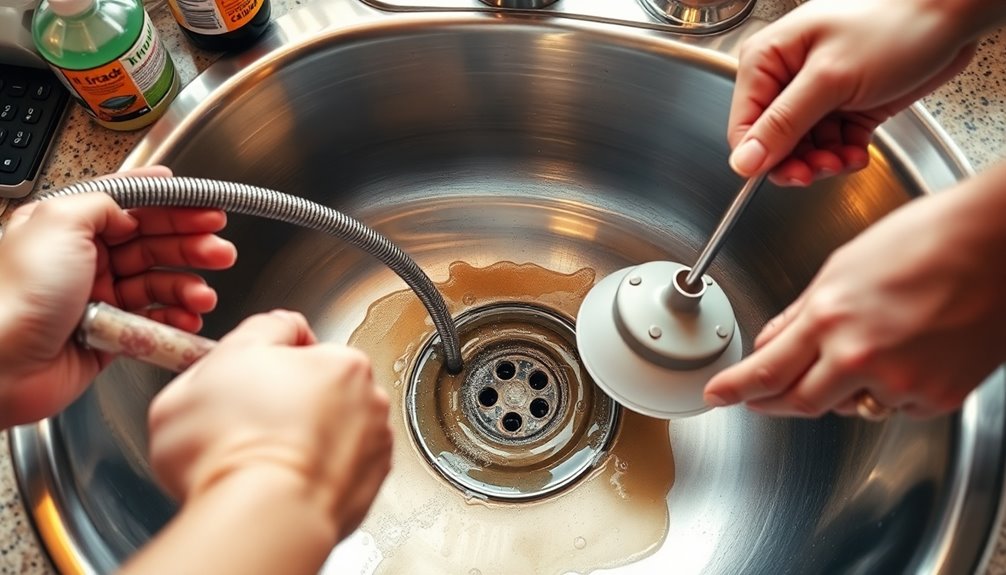
Knowing when to call a professional can save you time and prevent further damage to your plumbing. If you've tried DIY methods to clear a clog but the grease in your kitchen remains stubborn, it's time to reach out to a professional plumber.
Here are some signs to look for:
- Persistent clogs that cause water to back up into the sink.
- Foul odors or gurgling sounds indicating a significant blockage.
- Inability to restore normal drainage despite multiple attempts.
Experienced plumbers have access to specialized tools, such as motorized drain augers and hydro jetting, that can tackle these plumbing issues effectively.
Don't hesitate; timely professional service can prevent costly repairs down the line.
Frequently Asked Questions
What Will Dissolve Grease in a Drain?
If you're looking to dissolve grease in a drain, hot water works wonders by melting fats and oils.
You can also try a mixture of baking soda and vinegar; their bubbling reaction breaks down grease deposits effectively.
Dish soap combined with hot water is another great option, as it's designed to cut through greasy residues.
Just remember, while commercial drain cleaners can help, they're often harsh and might damage your pipes if misused.
How to Unblock Grease From a Sink?
Unblocking grease from a sink can feel like trying to push a boulder uphill.
Start by pouring a mixture of ½ cup baking soda followed by ½ cup vinegar down the drain. Let it bubble for a few minutes, then flush with boiling water.
If that doesn't work, grab a drain snake to tackle stubborn clogs.
To prevent future issues, regularly flush your drains with hot water and dish soap.
Will Drano Clear a Grease Clog?
Using Drano on a grease clog isn't the best choice.
While it might seem like a quick fix, it's not specifically designed to tackle grease and can cause more harm than good. The strong chemicals can damage your pipes, especially if they're PVC or metal.
Instead, try natural remedies like baking soda and vinegar or hot water with dish soap. They're safer and often more effective for breaking down grease without risking your plumbing.
What to Do if You Accidentally Pour Grease Down the Drain?
"An ounce of prevention is worth a pound of cure." If you accidentally pour grease down the drain, act quickly!
Flush the drain with hot water to help dissolve the fat. Next, mix baking soda with vinegar for a bubbling reaction that can break down the grease.
Follow up with more hot water to guarantee everything clears out. Avoid harsh chemicals, as they can damage your pipes and disrupt septic systems.
Conclusion
In summary, tackling grease buildup in your sink doesn't have to be an intimidating task. With simple methods like using vinegar or baking soda, you can restore your drain's flow. For instance, imagine a busy family in the middle of dinner prep—when their kitchen sink suddenly backs up with grease. By acting quickly with these easy solutions, they not only saved dinner but also prevented costly plumbing repairs. So, don't hesitate—try these methods and keep your drains flowing smoothly!
